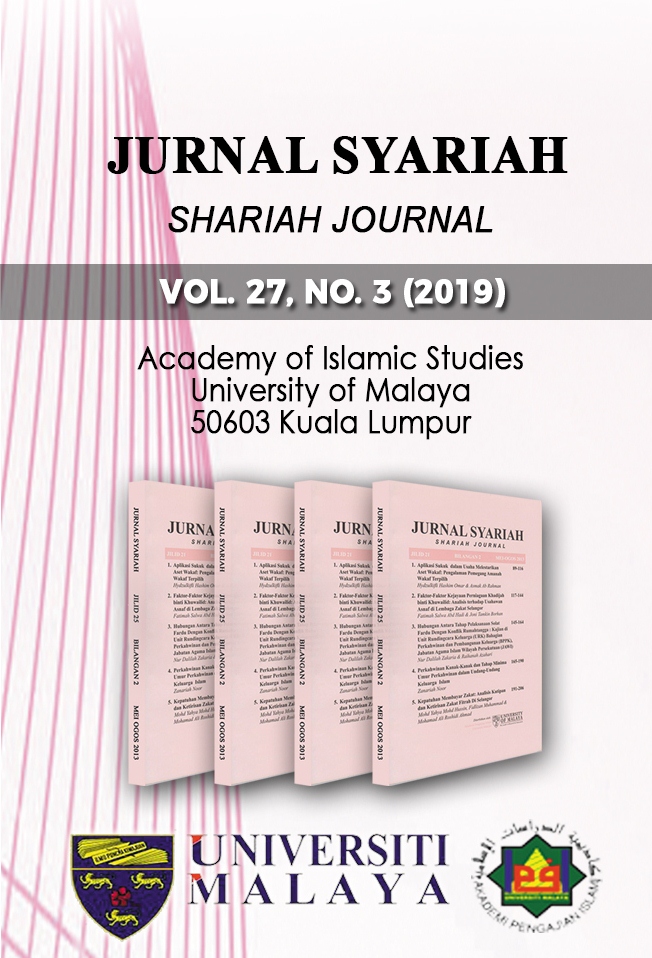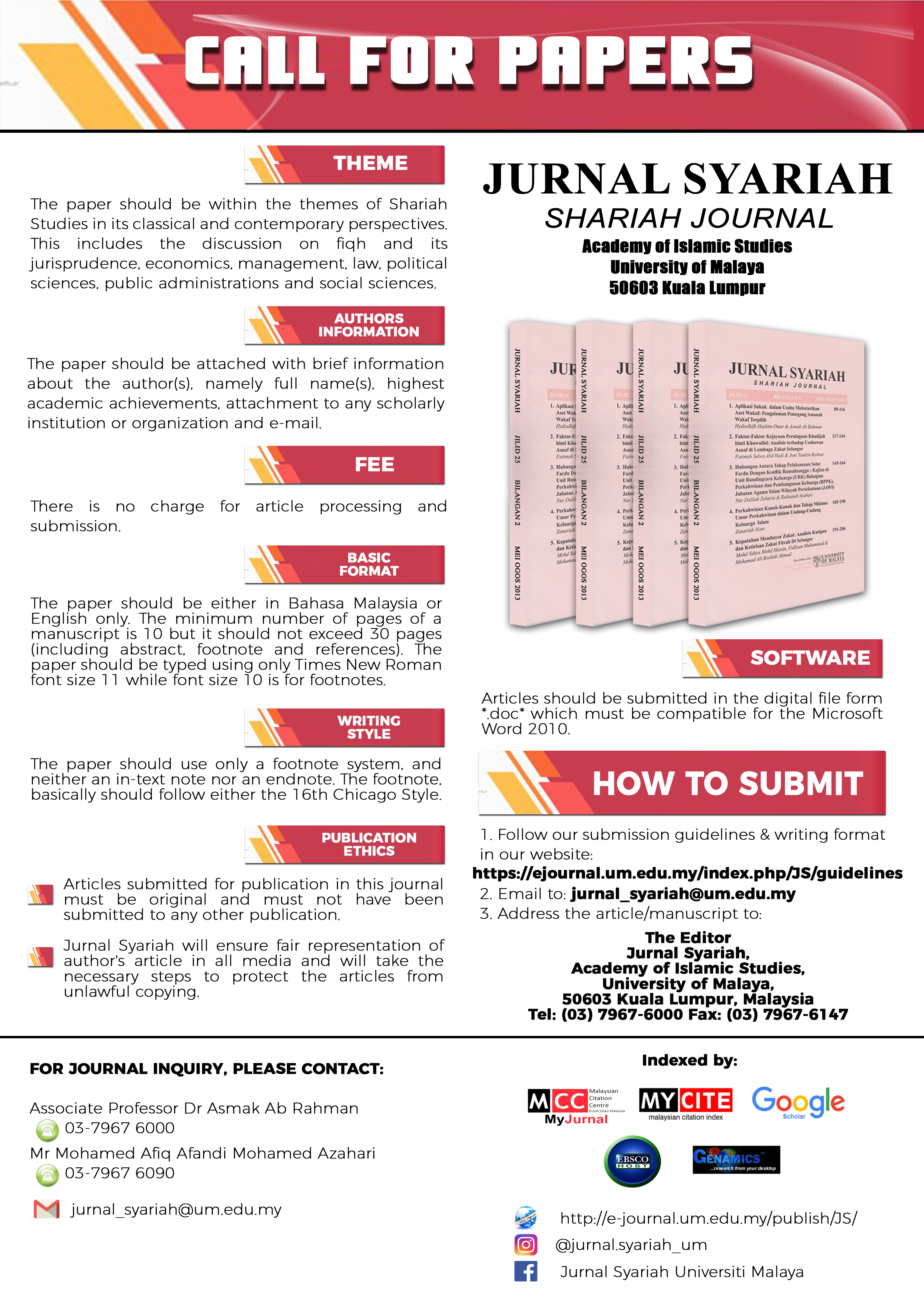THE PRACTICE OF DOWER AND DOWRY IN MUSLIM MARRIAGE IN BANGLADESH: A LEGAL ANALYSIS
DOI:
https://doi.org/10.22452/js.vol27no3.6Keywords:
dower, dowry, practice, impact, Shariah, statutory lawAbstract
Dower and dowry have become two common terms of Muslim marriage in Bangladesh. Dower is an exclusive right of Muslim wife to receive a part of the husband’s income at any time after marriage. Though it enhances the status and security of the Muslim, there is a situation where a wife does not receive dower from husband due to various socio-legal reasons. Moreover, there is a situation where a woman loses her legal rights of dower while she is entitled under both the Shariah and statutory laws. Then, there is an occurrence where a woman and her family become the victims of dowry practice by the husband even though it is un-Islamic. Nevertheless, there are some challenges to recover the dower but a dowry victim does not receive justice from laws and tradition. The article analyses the challenges of woman’s right for dower practice under the Shariah and Statutory laws and the impact of the traditional practice of dowry offer some suggestions for improving the family justice in Bangladesh.
Downloads
References
Afroza Begum, ‘Revisiting Domestic Violence as A Gross Violation of Women’s Fundamental Rights to Freedom From Torture’, Rajshahi University Journal of Law, vol. 4 (2007): 19-25.
Ain o Salish Kendra (ASK), “Human Rights Situation in Bangladesh,” http://www.askbd.org/ask/2019/01/10/human-rights-situation-bangladesh-2018-observation-ain-o-salish-kendra-ask/, accessed on 5 January 2019.
Aqil Ahmed, Mohammedan Law, 21st ed. (Allahabad: Central Law Agency, 2004).
David Pearl & Werner Manski, Muslim Family Law (Lahore, Pakistan: Brite Books, 1998).
Farah Deeba Chowdhury, ‘Dowry, Women, and Law in Bangladesh’, International Journal of Law, Policy and the Family, vol. 24/2 (2010): 198-221.
Fhameda Qudder, ‘Dowry System in Bangladesh: A Socio-Legal Perspective’, International Journal of Innovative Research and Development, vol. 3/7 (2014): 133-139.
H.R. Hahlo, ‘Matrimonial Property Regimes: Yesterday, Today and Tomorrow’, Osgoode Hall Law Journal, vol. 11/3 (1973): 455-478.
Md. Shahjahan (ed.), Yearly Law Digest, 2014 (Civil and Criminal) (Dhaka: Amin Book House, 2015).
Mohammad Abu Taher et al., ‘Combating Dowry Violence against Women in Bangladesh: A Critical Study’, International Journal of Innovation and Applied Studies, vol. 8/3 (2014): 1126-1131.
Nafiz Ahmed, ‘Existing Laws Against Dowry Are Entirely Unhelpful’, The Daily Star, 16 April 2019.
Nusrat Ameen, ‘Dowry in Bangladesh: How Many More Deaths to Its End?’ Journal of Faculty of Law, The Dhaka University Studies, vol. 8/1 (1997): 125-155.
Report of Human Rights Organization ‘Odhikar’, Annual Human Rights Report on Bangladesh, 2015. http://odhikar.org/annual-human-rights-report-2015-odhikar-report-on-bangladesh/, accessed on 11 July 2019.
Siwan Anderson, ‘The Economics of Dowry and Bride Price,’ Journal of Economic Perspectives, vol. 21/4 (2007): 151-174.
Syed Sahid Ahammad, ‘A Critical Analysis of Dower (Mahr) in Islam,’ Journal of Humanities and Social Science, vol. 21/7 (2016): 86-91.
Taskin Fahmina, ‘Are you a silent observer of dowry and related violence?’ odhikar.org, http://odhikar.org/are-you-a-silent-observer-of-dowry-and-related-violence/#sthash.8TdjpCGH.dpuf, published on 22 August 2017, accessed on 12 June 2019.
Taslima Monsoor, ‘Dowry Problem in Bangladesh: Legal and Socio-Cultural Perspective’, Journal of Faculty of Law, The Dhaka University Studies, Part-F vol. 14/1 June (2003): 1-6.
Taslima Monsoor, From Patriarchy to Gender Equity: Family Law and Its Impact on Women in Bangladesh (Dhaka: The University Press Limited, 1999).
Taslima Monsoor, Gender Equity and Economic Empowerment: Family Law and Women in Bangladesh (Dhaka: British Council, 2008).
Taslima Monsoor, Management of Gender Relations: Violence against Women and Criminal Justice System in Bangladesh (Dhaka: British Council, 2008).
UNICEF, Marriage, Inheritance and Family Laws in Bangladesh: Towards A Common Family Code (Bangladesh: Collaborative work of UNICEF and women for women- A Research and Study Group, 2005).
Statutes
3 LNJ (HDC) 2014, 862.
4 Apex Law Report (ALR) (HCD) 2014, 16.
Bangladesh Legal Citation (BLC) 2, 233.
Dhaka Law Report (DLR), 54, 481.
DLR 47, 1995 (HCD) 310.
DLR 8 (WP) (1956) 133.
The Dissolution of Muslim Marriage Act 1939.
The Dowry Prohibition Act 1980.
The Dowry Prohibition Act, 2018.
The Family Courts Ordinance, 1985.
The Muslim Family Laws Ordinance 1961.
The Muslim Marriage and Divorce (Registration) Rules 1975.
Cases
Atiqul Huque Chowdhury v. Shahana Rahim, DLR 47, 1995 (HCD) 310.
Jesmin Sultana v. Md. Elias, Bangladesh Legal Citation (BLC) 2, 233.
Shafiqul Huq v. Mina Begum, Dhaka Law Report (DLR), 54, 481.
Shah Banu Begum v. Iftekhar Md. Khan, DLR 8 (WP) (1956) 133.
State v. Azaharul Islam and others, 3 LNJ (HDC) 2014, 862.
State v. Oliar Rahman, 4 Apex Law Report (ALR) (HCD) 2014, 16.
Downloads
Published
How to Cite
Issue
Section
License

This work is licensed under a Creative Commons Attribution-NonCommercial 4.0 International License.
COPYRIGHT: All rights reserved. Not allowed to be reproduced any part of articles and contents of this journal in any form or by any way, whether electronic, mechanical, photocopying, recording or otherwise without permission in writing from the Chief Editor, Jurnal Syariah.



















